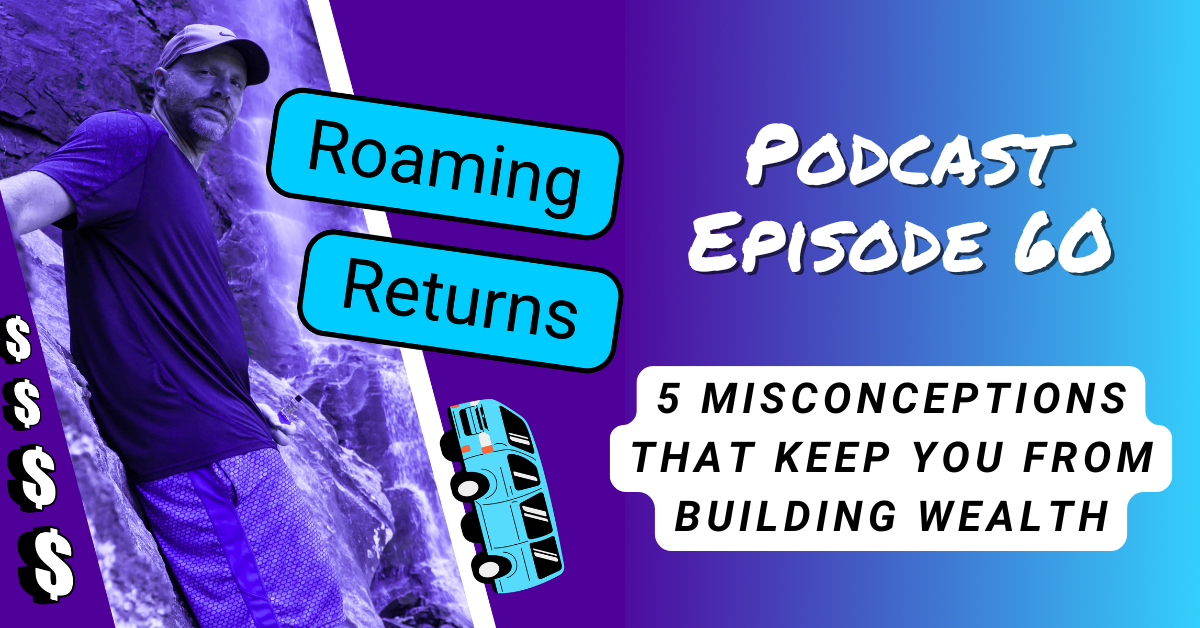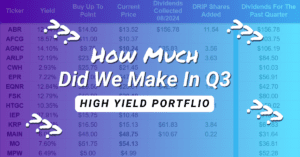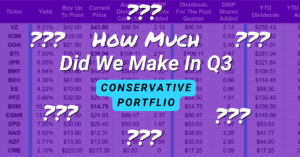Listen right here or on your favorite podcast platform.
If you’re swear sensitive, we also have a censored version on our YouTube Channel.
And now, onto the summary of Episode 60 of our Roaming Returns Podcast.
Many people struggle with budgeting despite knowing it’s one of the foundational pillars of financial wellness. So why do some people succeed with money while others struggle?
Contrary to what most people believe, the answer lies in the mindset and habits, not in making more money. And a really powerful mindset that all financially savvy individuals have is being frugal.
If frugality makes you think of deprivation or penny-pinching, it’s not surprising that you’re missing out on this powerful trait. Associating negative emotions and loss with money is a receipt for struggle.
Your beliefs shape your habits and your habits create either success or struggle
In this episode, we’re going to clarify what it really means to be frugal because there are many misconceptions out there that need to be set straight.
In Your Money or Your Life, Vicki Robin and Joe Dominguez define frugality as a way of enjoying what you have while avoiding waste — not just your money, but your life energy. I love their book.
Frugality isn’t about saying “no” to everything or living without joy. It’s about making intentional, thoughtful decisions with your money. If you spend your income on the things that truly matter to you, you will create a fulfilling life.
Misconceptions About Frugality
#1 Frugality Does Not Mean Being Cheap
Belief: People often think frugality is synonymous with being stingy or cheap, implying a reluctance to spend any money, even on necessary or high-quality items.
Reality: Being cheap and being frugal are not even in the same ballpark. Frugality is about making thoughtful and intentional spending decisions. Being cheap often means avoiding as much spending as possible.
#2 Frugality Is Not About Deprivation
Belief: It’s a common misunderstanding that frugal individuals deprive themselves of enjoyable experiences, good food, and quality products.
Reality: Frugal people prioritize value and necessity over impulse or extravagance. They’re willing to spend money on the things they value, but not on the things that aren’t important to them. And because they immerse in more meaningful experiences, frugal individuals often feel content and happy.
#3 Everyone Who Adopts A Frugal Mindset Can Benefit Greatly
Belief: Many people don’t think they need to be frugal unless they’re poor or struggling financially.
Reality: Frugality is a mindset embraced by people at all income levels to achieve goals, reach financial security, and build wealth. It’s a way of living that enhances quality of life which is why people continue to embody it throughout their financial journey.
#4 It’s Not Time-Consuming Or Complicated To Practice Frugality
Belief: Some people think that being frugal requires an excessive amount of time and effort to find deals, clip coupons, and manage finances.
Reality: While there is some initial effort required to establish frugal habits (like anything else that’s new), it doesn’t have to be complicated since there are many tools and techniques to help simplify the process. Frugal people also value their time and like to be efficient.
It becomes easier with practice. You just have to believe that the benefits outweigh the effort you’re putting in in the beginning.
#5 Frugality Is Not About Low Quality Anything
Belief: Frugal people always choose the cheapest options which means having low quality products or less than desirable experiences.
Reality: Frugality is about finding the best value, not necessarily the lowest price. Frugal individuals often invest in high-quality items that last longer and provide great experiences over the lifespan of the product.
What Being Frugal Really Means
Spending Intentionally
Frugal people make conscious decisions about where their money goes, making sure that their spending aligns with their values and goals. They prioritize spending money on what matters most to them and cut back on less important areas.
Being Resourceful
Frugality involves finding creative ways to save money, such as DIY projects, repurposing items, and maximizing the use of what they already have. It’s about getting the most value out of every dollar spent.
It can also mean choosing to hire out time consuming and complex tasks if your time is more valuable elsewhere. For example, if you make more from working than the time spent learning, buying tools, and actually repairing your car.
Creating Financial Security
Being frugal helps build a financial safety net through saving and investing, reducing stress, and providing peace of mind. It enables better financial preparedness for emergencies and future goals.
Being Mindful and Sustainability Conscious
Frugality often goes hand-in-hand with sustainable living. Because frugal people are intentional they naturally become mindful of their consumption. So they often reducing waste and end up making environmentally conscious choices.
Prioritizing Long-Term Goals
Frugal people are both aware of the present and the future. They choose to focus on long-term financial health rather than immediate gratification, because they understand the importance of saving for retirement, emergencies, and other future needs.
Living Within Your Means
Frugality emphasizes living within your financial means. That translates to spending less than you earn. These people are disciplined. They avoid debt and practice smart money management.
Frugal people are wise with their money
Now that we’ve redefined what it means to be frugal, you can start taking action to embrace this amazing way of living. You will feel empowered — not restricted — on your journey to financial security.
Remember it’s not about giving up what you love but aligning your spending with the things you value the most. Whether it’s time with your loved ones, self care, or things that bring you happiness, prioritize what truly enriches your life.
We value having new experiences and exploring nature. That’s why we hike so much and decided to move into a van.
Let us know what you truly value. Leave a comment below.




